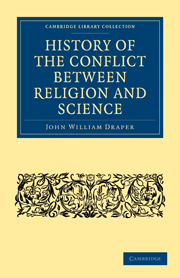Book contents
- Frontmatter
- Preface
- Contents
- CHAPTER I THE ORIGIN OF SCIENCE
- CHAPTER II THE ORIGIN OF CHRISTIANITY.—ITS TRANSFORMATION ON ATTAINING IMPERIAL POWER.—ITS RELATIONS TO SCIENCE
- CHAPTER III CONFLICT RESPECTING THE DOCTRINE OF THE UNITY OF GOD.—THE FIRST OR SOUTHERN REFORMATION
- CHAPTER IV THE RESTORATION OF SCIENCE IN THE SOUTH
- CHAPTER V CONFLICT RESPECTING THE NATURE OF THE SOUL.—DOCTRINE OF EMANATION AND ABSORPTION
- CHAPTER VI CONFLICT RESPECTING THE NATURE OF THE WORLD
- CHAPTER VII CONTROVERSY RESPECTING THE AGE OF THE EARTH
- CHAPTER VIII CONFLICT RESPECTING THE CRITERION OF TRUTH
- CHAPTER IX CONTROVERSY RESPECTING THE GOVERNMENT OF THE UNIVERSE
- CHAPTER X LATIN CHRISTIANITY IN RELATION TO MODERN CIVILIZATION
- CHAPTER XI SCIENCE IN RELATION TO MODERN CIVILIZATION
- CHAPTER XII THE IMPENDING CRISIS
- INDEX
CHAPTER IX - CONTROVERSY RESPECTING THE GOVERNMENT OF THE UNIVERSE
Published online by Cambridge University Press: 29 August 2010
- Frontmatter
- Preface
- Contents
- CHAPTER I THE ORIGIN OF SCIENCE
- CHAPTER II THE ORIGIN OF CHRISTIANITY.—ITS TRANSFORMATION ON ATTAINING IMPERIAL POWER.—ITS RELATIONS TO SCIENCE
- CHAPTER III CONFLICT RESPECTING THE DOCTRINE OF THE UNITY OF GOD.—THE FIRST OR SOUTHERN REFORMATION
- CHAPTER IV THE RESTORATION OF SCIENCE IN THE SOUTH
- CHAPTER V CONFLICT RESPECTING THE NATURE OF THE SOUL.—DOCTRINE OF EMANATION AND ABSORPTION
- CHAPTER VI CONFLICT RESPECTING THE NATURE OF THE WORLD
- CHAPTER VII CONTROVERSY RESPECTING THE AGE OF THE EARTH
- CHAPTER VIII CONFLICT RESPECTING THE CRITERION OF TRUTH
- CHAPTER IX CONTROVERSY RESPECTING THE GOVERNMENT OF THE UNIVERSE
- CHAPTER X LATIN CHRISTIANITY IN RELATION TO MODERN CIVILIZATION
- CHAPTER XI SCIENCE IN RELATION TO MODERN CIVILIZATION
- CHAPTER XII THE IMPENDING CRISIS
- INDEX
Summary
There are two conceptions of the government of the world: 1. By Providence; 2. By Law.—The former maintained by the priesthood.—Sketch of the introduction of the latter.
Kepler discovers the laws that preside over the solar system.—His works are denounced by papal authority.—The foundations of mechanical philosophy are laid by Da Vinci.—Galileo discovers the fundamental laws of Dynamics.—Newton applies them to the movements of the celestial bodies, and shows that the solar system is governed by mathematical necessity.—Herschel extends that conclusion to the universe.—The nebular hypothesis.—Theological exceptions to it.
Evidences of the control of law in the construction of the earth, and in the development of the animal and plant series.—They arose by Evolution, not by Creation.
The reign of law is exhibited by the historic career of human societies, and in the case of individual man.
Partial adaption of this view by some of the Reformed Churches.
Two interpretations may be given of the mode of government of the world. It may be by incessant divine interventions, or by the operation of unvarying law.
To the adoption of the former a priesthood will always incline, since it must desire to be considered as standing between the prayer of the votary and the providential act. Its importance is magnified by the power it claims of determining what that act shall be. In the pre-Christian (Roman) religion, the grand office of the priesthood was the discovery of future events by oracles, omens, or an inspection of the entrails of animals, and by the offering of sacrifices to propitiate the gods. In the later, the Christian times, a higher power was claimed; the clergy asserting that, by their intercessions, they could regulate the course of affairs, avert dangers, secure benefits, work miracles, and even change the order of Nature.
- Type
- Chapter
- Information
- History of the Conflict between Religion and Science , pp. 228 - 254Publisher: Cambridge University PressPrint publication year: 2009First published in: 1875



